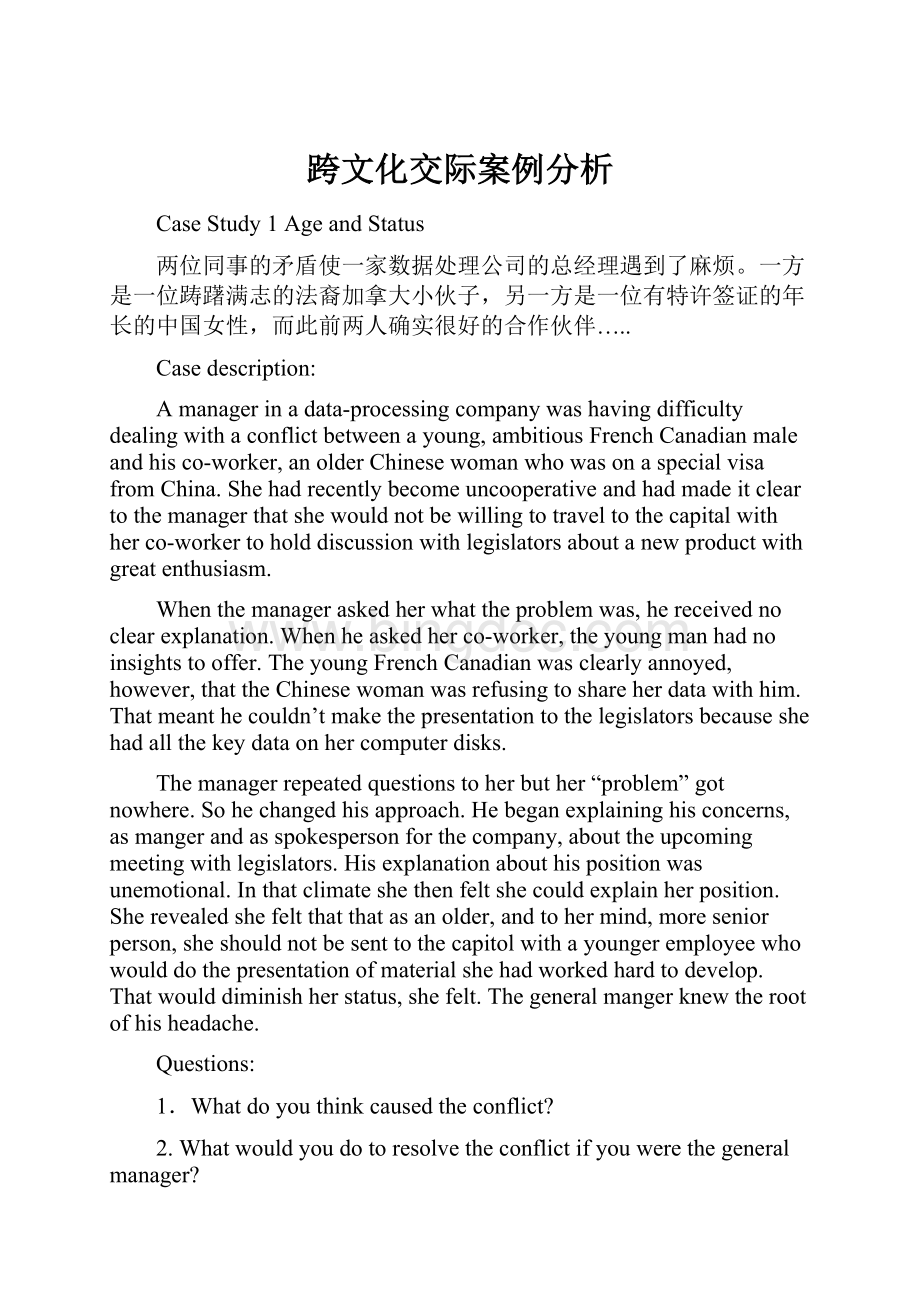跨文化交际案例分析.docx
《跨文化交际案例分析.docx》由会员分享,可在线阅读,更多相关《跨文化交际案例分析.docx(15页珍藏版)》请在冰点文库上搜索。

跨文化交际案例分析
CaseStudy1AgeandStatus
两位同事的矛盾使一家数据处理公司的总经理遇到了麻烦。
一方是一位踌躇满志的法裔加拿大小伙子,另一方是一位有特许签证的年长的中国女性,而此前两人确实很好的合作伙伴…..
Casedescription:
Amanagerinadata-processingcompanywashavingdifficultydealingwithaconflictbetweenayoung,ambitiousFrenchCanadianmaleandhisco-worker,anolderChinesewomanwhowasonaspecialvisafromChina.Shehadrecentlybecomeuncooperativeandhadmadeitcleartothemanagerthatshewouldnotbewillingtotraveltothecapitalwithherco-workertoholddiscussionwithlegislatorsaboutanewproductwithgreatenthusiasm.
Whenthemanageraskedherwhattheproblemwas,hereceivednoclearexplanation.Whenheaskedherco-worker,theyoungmanhadnoinsightstooffer.TheyoungFrenchCanadianwasclearlyannoyed,however,thattheChinesewomanwasrefusingtoshareherdatawithhim.Thatmeanthecouldn’tmakethepresentationtothelegislatorsbecauseshehadallthekeydataonhercomputerdisks.
Themanagerrepeatedquestionstoherbuther“problem”gotnowhere.Sohechangedhisapproach.Hebeganexplaininghisconcerns,asmangerandasspokespersonforthecompany,abouttheupcomingmeetingwithlegislators.Hisexplanationabouthispositionwasunemotional.Inthatclimateshethenfeltshecouldexplainherposition.Sherevealedshefeltthatthatasanolder,andtohermind,moreseniorperson,sheshouldnotbesenttothecapitolwithayoungeremployeewhowoulddothepresentationofmaterialshehadworkedhardtodevelop.Thatwoulddiminishherstatus,shefelt.Thegeneralmangerknewtherootofhisheadache.
Questions:
1.Whatdoyouthinkcausedtheconflict?
2.Whatwouldyoudotoresolvetheconflictifyouwerethegeneralmanager?
矛盾冲突
这位年长的中国女士投入极大的热情和精力开发产品.却在最后的关键时刻拒绝与年轻的同事一同去向议员做推介:
当经理和同事问其原因.她并未做任何明确的回答:
而当经理改变策略,不再直接询问原因,而是迂回地讲起自己的困境时,她才道出自己的顾虑。
在这位资深年长的中国女士看来,同一位比她年轻的同事一同去国会,并且由对方来做推介会影响到她的地位和威信,因此她无法同意:
原因分析
造成这一矛盾的文化因素有两方面.对地位、年龄的不同态度以及这种不同的表达方式。
人对权力的认识因文化背景的不同而不同。
根据霍夫斯特的调查研究,“低权力距离”国家的人强调个人的能力和信用,人与人之间权利和关系的平等,而.”高权力距离”国家,如中国、日本、纬国,强调地位、经验、年龄、资历等,人与人之间存在级别差距;因此在这位年轻的加拿大人看来,在工作上他与这位女士是平等的合作伙伴,并没有地位的差别,自己也有能力参与项目并做最后报告。
而在这位中国女士看来,以自己的年龄、资历、以及工作中的付出,与一个年轻人一同去国会,并且由对方来做报告对她来说是一件丢面子的事:
另外.双方表达方式的不同也导致了矛盾的加深。
根据霍尔的理论,加拿大是“低语境”国家,中国属于“高语境”文化国家,因此,当她的加拿大同事没有充分考虑到她所处的位置.而是直接问她原因时,这位中国女士采用了婉转回进的策略,没有直接说出自己的想法。
而当经理改变方法迂回地说到自己的难处时,在这种语境下她才说出自己的顾虑。
Lowpowerdistance"countryonindividualabilityandcredit,therelationshipbetweenrightsandequality,and."highpowerdistance"countries,suchasChina,Japan,weftkingdom,emphasizingthestatus,experience,age,qualifications,existinggapbetweenpeoplelevel。
SointheyoungCanadianopinion,intheworkheandthewomanareequalpartners,andthedifferenceinnoposition,alsohastheabilitytoparticipateinprojectanddothelastreport.AndintheChinesewomenseemto,intheirownage,qualifications,andworkinpay,andayoungmantogethertocongress,andbyeachothertodothereportforherisaloseface:
Outside.Bothsidesexpressingwaydifferentledtothedeepeningofcontradictions.Accordingtothetheoryofhall,Canadais"lowcontext"countries;Chinabelongsto"highcontext"culturecountries,
文化沟通
当与不同文化背景、年龄、地位的人进行跨文化交流合作时,我们应当充分了解对方价值观中对这些个人因素的看法,决策前应采用合适的方式进行有效的协商,以便避免和化解因文化背景、价值观不同引起的矛盾。
本案例中的经理在理解她的难处之后,可以在全公司内正式的公布这位女士的工作成果,给予高度的认可.同时在议会的报告中也应体现出其工作的重要意义,使之得,得到应有的重视。
Thiscaseofmanagerinunderstandingherdifficultyaftercaninallthecompanyreleasedwithintheformalthelady'swork,togivehighrecognition.Atthesametimeintheparliamentaryreportshouldreflectitsimportance,make,andgettheattentionitdeserves.
CaseStudy2PraisingJapaneseinPublicWorkplaces(在工作场所当众表扬日本人)
琼斯先生(美国经理)当众表扬苏琦木拓(日本员工)工作做得很棒,本以为苏琦木拓会高兴的接受,却不料…..
Casedescription:
American:
Mr.Sugimoto,Ihavenoticedthatyouaredoinganexcellentjobontheassemblyline.Ihopethattheotherworkersnoticehowitshouldbedone.
Japanese:
(Heisuneasy).Praiseisnotnecessary.Iamonlydoingmyjob.(HehopesotherJapaneseworkersdonothear.)
American:
Youarethefinesse,mostexcellent,dedicatedworkerwehaveeverhadattheJonesCorporation.
Japanese:
(Heblushedandnodshisheadseveraltimes,andkeepsworking.)
American:
Well,areyougoingtosay“thankyou,”Mr.Sugimoto,orjustremainsilent?
Japanese:
Excuseme,Mr.Jones…MayItakeleaveforfiveminutes?
American:
Sure.(HeisannoyedandwatchedSugimotoexit).Ican’tbelievehowrudesomeJapaneseworkersare.Theyseemtobedisturbedbypraiseanddon’tansweryou…justsilent.
Questions:
WhywastheconversationbetweenMr.JonesandMr.Sugimotonotsopleasant?
Whydidtheyhavesuchdifferentreactionstowardspraisinginpublicworkplaces?
IfyouwereMr.Sugimoto,wouldyouacceptpraisefromMr.Jonesinpublicworkplaces?
IfwereMr.Jones,howwouldyoudealwiththesituationmoreappropriately?
分析
矛盾冲突
从对话中可以看出,琼斯先生认为在其他工人面前表扬苏奇木拓先生是对他工作的肯定.也是对他个人的认可,苏奇木拓先生应该高兴地接受,不必遮遮掩掩不好意思,更不应该一句话不说就走了。
但琼斯先生只是从美国强调个人的概念出发,却不熟悉日本人是如何看待个人和集体的关系,不知道如何向日本同事表示欣赏和赞扬.结果适得其反。
琼斯先生和苏奇木拓交流失败的原因主要在于都对双方的文化了解不深,特别是双方对个人与集体关系的看法不同。
原因分析
在霍夫斯特的“个体取向与集体取向”53个国家和地区的列表中美国排在第一位.而日本排在22位,这意味着美国是非常强调个人主义的国家,而日本更注重的是集体。
在美国鼓励个人创断,提倡竟争.个人会因业绩优异而受到上司表扬,这是一种典型的美国式做法。
特别是如果在同事面前受到表扬,个人会觉得很自豪,因为成绩得到了上级的认可,同时也在同事中间表现了自己,实现了自我价值。
在美国,受到表扬的人往往会说“谢谢”’以作回答。
TheUnitedStatesisverystressedindividualismcountry,andJapanaremorefocusedontheircollective.IntheUnitedStatesencouragesindividualcreative,advocatingcompetition.Individualwillandexcellentperformancebybossforpraise,thisisakindoftypicalAmericanpractices.Especiallyifinfrontofmycolleagueshavebeenpraised,peoplewillfeelveryproud,becausetheresultsobtainedsuperiorapprobate,andalsoinamongcolleaguesshowed,realizetheegovalue.IntheUnitedStates,whopraisedwilloftensay"thankyou"toanswer".所以案例中的琼斯先生认为苏奇木拓先生也应该以这样的方式接受表扬。
出乎他意抖的是,那位受到表扬的日本工人对他的表扬感到不安,没把表扬当回事:
美国经理接着用更肯定的语气维续表扬他,如用英语中的最高级形容词“最优秀的”、“最杰出”、‘最勤奋”等等。
使他更吃惊的是:
他的这番赞扬之词使那位日本工人更1危脸,脸一下红了起来,只是理头干活.不再言语,仅仅点了两下头。
对于这样的回答或拒绝表扬.美国经理实在是无法理解,也无法忍受这种沉默不语,于是直截了当地向他发问道:
“你打算说声谢谢呢,还是要选择继续保待沉默呢?
”责备他表现“没礼貌”。
Themanagerwasunabletounderstand,alsocan'tstandforthesilent,thentostraightouthehairasked:
"areyougoingtosay?
Thankyou,ortochoosetocontinuethestaysilent?
"Blamehimtoshow"rude".他所不知的是,日本是典型的集体主义国度,在日本个人要忠实于集体,集体内部的成员要团结一致不倾向于突出个人业绩.而是强调集体协作。
所以当苏奇木拓先生在同事面前受到表扬时,非常地局促不安.只是低头干自己的事情,甚至要求要离开五分钟,没有正面给琼斯先生任何答复.因为他觉得这样把他和所属的集体分离开了.使他在同事面前失去了面子。
另一方面.美国经理由于对日本文化特点的无知,公开表扬不仅把那位日本工人弄得无言以答,而且会失去在其他日本工人对他的尊敬。
Japanistypicalofcollectivesocialistcountry,inJapaneseindividualshouldbefaithfultothecollective,themembersofthecollectivetointernalunitydon'ttendtooutstandingindividualperformance.Butemphasizethecollectivecooperation.SowhenSuJiMuMrExtensioninfrontofmycolleagueswhenpraisedveryillatease.Justdotheirownthingsdown,evenwanttoleavefiveminutes,nopositiveforMrJonesanyreply.Becausehefeltthatheandthesubordinatetothecollectiveisolates.Tohisinfrontofmycolleagueslostface.Ontheotherhand.ThemanagerbecauseofJapaneseculturecharacteristicsofignorance,publicpraisenotonlytheJapaneseworkersmakecouldanswer,andwillloseintheotherJapaneseworkerstohisrespect.
从对话中也可以看出苏奇木拓先生不接受当众表扬,却只是保持沉默,甚至要走开,没有把他的不满当众表达出来。
这样的行为使得琼斯先生认为日本员工不礼貌。
这一交际失致和日美两国交流方式不同有很大关系。
根据霍尔(Hail)的“高语境”和”低语境”理论,日本是典型的高语境国家,交流方式含蓄委婉,不会轻易在众人面前表达不满,会更多的依赖于非言语交流."Highcontext"and"lowcontext"theory,Japanistypicalhighcontextcountries,communicationimplicativetactful,noteasilyinthepresenceofallexpressdiscontent,willbemoredependentonnon-verbalcommunication.如苏奇木拓先生不作回答保持沉庆,只是干自己的工作,以此表示对当众表扬的不满。
而美国属于”低语境”国家,习惯直接的语言交流方式,.AndtheUnitedStatesbelongsto"lowcontext"countries,usedtodirectlanguagecommunication当苏奇木拓先生显得不安时,球斯先生却说“你打算说谢谢呢,还是要选择沉默?
”。
当苏奇木拓先生要求离开时,琼斯先生就认为没有任何回答就离开是不礼貌的。
文化沟通
双方应该对彼此的文化有所了解,应该清楚两种文化对个人的不同看法和不同的交流方式.不要总是从自己的出发点看问题。
琼斯先生应该知道最好不要当众表扬某个日本人,而是应该私下单独表扬,或者会开表扬某个集体或团队;要清楚日本人的交流方式比较委婉间接,为了集体的和谐他们通常不会在公开场合表示不满。
而苏奇木拓先生也应该了解美国时个人的重视,公开表扬个人是对他能力的认可;美国人更喜欢直接的语言交流,有什么想法要说出来,而不是要保持沉默或是回避Bothsidesshouldunderstandthecultureforeachother,shouldbeclearthattwokindsofcultureonpersonaldifferentviewsanddifferentwayofcommunication.Don'talwayslookatproblemsfromtheirstartingpoint.MrJonesshouldknowbetternotpraiseinpublicaJapanese,butshouldpraisealone,orwillopenpraiseacollectiveorteam;WanttobeclearabouttheJapanesewayofcommunicationmoretactfulindirectly,totheharmonyofcollectivetheyusuallydon'tpubliclyexpresseddissatisfaction.AndSuJiMuMrShouldknowtheextensionoftheindividualattentionwhen,publicpraiseforhispersonalabilityistheapproval;Americanspreferdirectlanguageexchange,havewhatideatosay,butnottoremainsilentoravoid
Case3ABritishGeneralManagerinThailand英国总经理在泰国
一位英国总经理来到泰国上任,到任之初,没想到使用什么样的车上班这个小问题给他带来了不小的烦恼…….
Casedescription:
ABritishgeneralmanageruponarrivalinThailandrefusedtotakehispredecessor’scar.TheThaifinancemanageraskedthenewGMwhattypeofMercedeshewouldlike,then,TheGMaskedforaSuzukioraMini,anythingthatcouldbehandledeasilyinthecongestedtrafficinBangkok.
ThreeweekslatertheGMcalledthefinancemangerandaskedaboutprospectsforthedeliveryofhiscar.TheThailosthisreserveforamomentandexclaimed:
“wecangetyouanewMercedesbytomorrow,butSuzukitakemuch,muchlonger.”TheGMaskedhimtoseewhathecoulddotospeeduptheprocess.AfterfourweekstheGMaskedtoseethepurchaseorderforthecar.Thepurchasingdepartmentrepliedthat,becauseitwouldtakesolongtogetasmallcar,theyhaddecidedtoorderaMercedes.
TheGM’spatiencehadrunout.